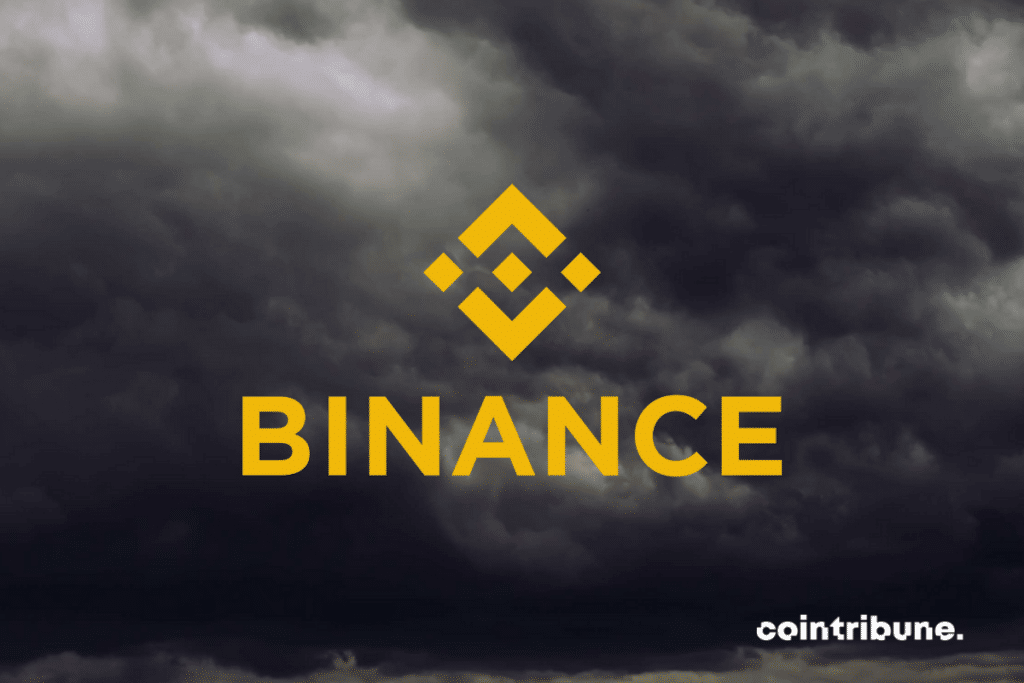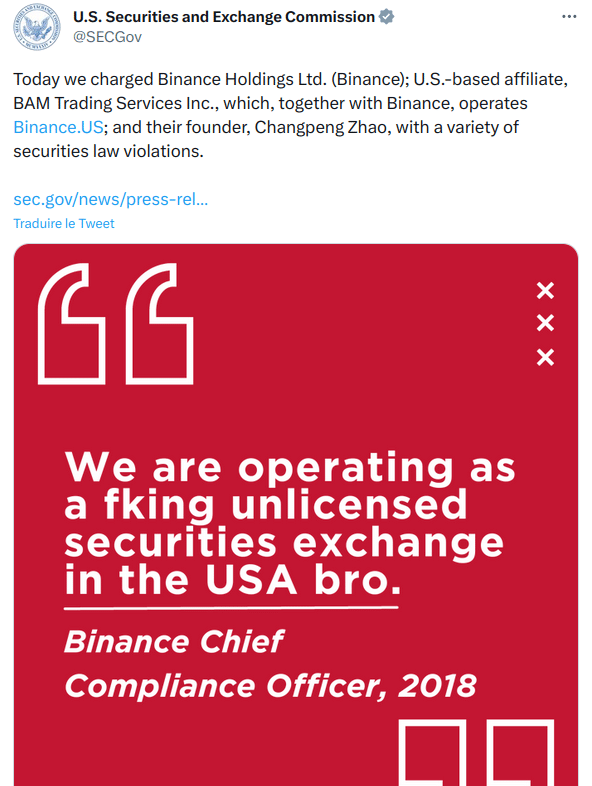Binance under dark clouds
The SEC has revealed a whole list of shitcoins that Binance should have registered as securities. What about Ethereum? And wash trading?

ETH spared by the SEC?
The SEC has filed a lawsuit against Binance and its US subsidiary (BAM Trading Services), which operates the Binance.US exchange.
Binance is accused, among other things, of offering its clients the opportunity to invest in unregistered securities with the SEC.

Since its launch, Binance US has allowed trading of unregistered securities, including, “but not limited to, BNB, BUSD, SOL, ADA, MATIC, FIL, ATOM, SAND, MANA, ALGO, AXS, and COTI.”
The SEC didn’t dare name ETH. Its chairman, Gary Gensler, probably played it safe after recently discovering that the organizations behind Ethereum have a presence in the US Congress.
These organizations include Consensys, the Ethereum Foundation, and the Enterprise Ethereum Alliance. But also Coinbase, which is currently raising hundreds of millions of dollars through its ETH “staking” offering. Not to mention crypto VC firms like Andreessen Horowitz.
As a reminder, ConsenSys owns the company Infura, which manages MetaMask, the Ethereum wallet. Infura made headlines a few months ago due to its collection of IP addresses and Metamask wallet addresses.
The Enterprise Ethereum Alliance is an organization lobbying for ETH. It includes giants like Accenture, which has a hand in almost every CBDC project, as well as Banco Santander, JPMorgan, and Microsoft.
This faction has been spending a lot of money in Washington for years. Its goal is to prevent Ethereum from being classified as a “security.” In other words, they aim to give it the same “commodity” status as Bitcoin.
Achilles’ staking
Since the famous “Merge” on September 15, Ethereum has changed its consensus mechanism, moving from Proof-of-Work to Proof-of-Stake. Instead of providing energy, it now “only” requires depositing 32 ETH to participate in the transaction validation process.
Few people own 32 ETH, so companies like Lido or Coinbase allow their clients to pool their ETH. This is the famous “staking” service. Kraken recently ended this service under pressure from the SEC.
Thus, even though ETH is not explicitly mentioned in the SEC’s complaint, staking is indeed considered subject to securities law.
In other words, dark clouds are gathering over Binance, and hefty fines should not be far off.
Binance’s customers are not mistaken and are withdrawing their funds at the highest rate since the US banking crisis in March. According to Coinglass, over 13,300 BTC has been withdrawn in the past 24 hours. Over 30,000 BTC in a month. The exchange is already experiencing net outflows of over $1.5 billion, according to Blockwork.
Many people have been complaining since yesterday about having to reverify their identities by submitting new documents. It’s a way to stem the bleeding…
According to DeFiLlama, Binance’s assets still amount to $60.5 billion.
Binance’s response
Binance responded in this statement. Far from making amends, the exchange continues to pretend not to understand the law:
“While we take the SEC’s allegations seriously, they should not be the subject of an SEC enforcement action, let alone on an emergency basis. We intend to defend our platform vigorously. Unfortunately, the SEC’s refusal to productively engage with us is just another example of the Commission’s misguided and conscious refusal to provide much-needed clarity and guidance to the digital asset industry.”
Binance claims to be “surprised” and warns that “the SEC’s actions undermine America’s role as a global hub for financial innovation and leadership.”
But is a shitcoin casino really an innovation?
The truth is that there is no demand for shitcoins. The SEC accuses Binance of engaging in wash trading of shitcoins. This includes through the market maker Sigma Chain, a company controlled by CZ.
Wash trading involves buying and selling a security with the express purpose of attracting investors by making them believe that the transaction volumes are higher than they actually are.
“Zhao’s control over BAM Trading and Sigma Chain allowed the latter to engage in market manipulation on Binance.US. […] From June to August 2021, Sigma Chain repeatedly engaged in wash trading with 51 out of the 58 crypto-assets available on Binance.US,” according to the SEC complaint.
If there was real demand for shitcoins, such illegal practices wouldn’t be necessary.
Without wash trading, there would be no shitcoin traders, and the majority of the casino’s revenue would disappear.
Maximize your Cointribune experience with our "Read to Earn" program! For every article you read, earn points and access exclusive rewards. Sign up now and start earning benefits.
The Cointribune editorial team unites its voices to address topics related to cryptocurrencies, investment, the metaverse, and NFTs, while striving to answer your questions as best as possible.
The views, thoughts, and opinions expressed in this article belong solely to the author, and should not be taken as investment advice. Do your own research before taking any investment decisions.